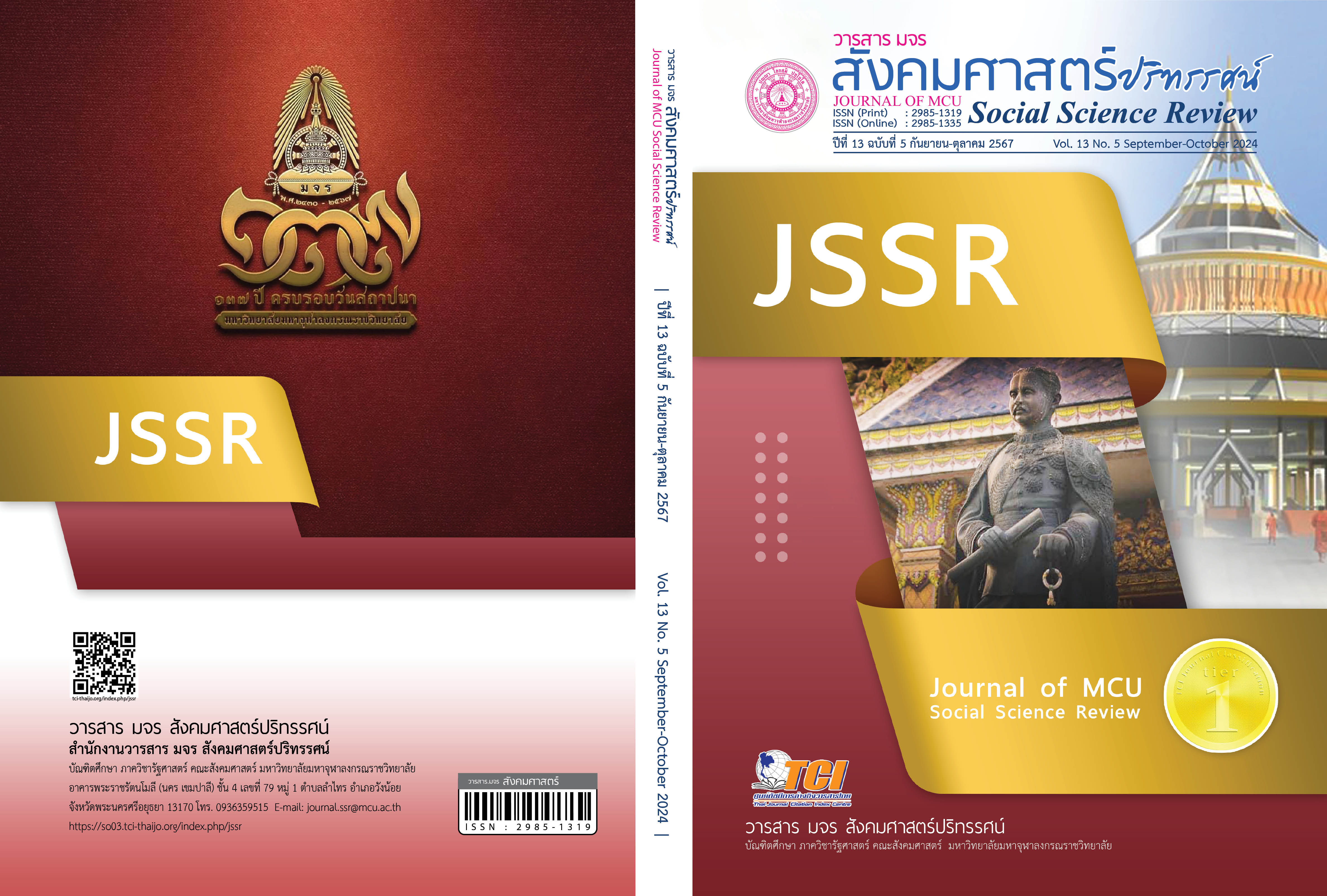ภาวะผู้นำการเปลี่ยนแปลงและการจัดการระบบสารสนเทศส่งผลต่อการจัดการภาวะวิกฤตของธุรกิจโรงแรมในประเทศไทย
คำสำคัญ:
ภาวะผู้นำการเปลี่ยนแปลง, การจัดการระบบสารสนเทศ, การจัดการภาวะวิกฤตบทคัดย่อ
บทความวิจัยครั้งนี้มีวัตถุประสงค์ 1. ศึกษาภาวะผู้นำการเปลี่ยนแปลง การจัดการระบบสารสนเทศ และการจัดการภาวะวิกฤตของธุรกิจโรงแรมในประเทศไทย 2. ศึกษาภาวะผู้นำการเปลี่ยนแปลงและการจัดการระบบสารสนเทศที่ส่งผลต่อการจัดการภาวะวิกฤตของธุรกิจโรงแรมในประเทศไทย ซึ่งงานวิจัยนี้เป็นการวิจัยเชิงปริมาณ กลุ่มตัวอย่างในการวิจัยคือ ผู้จัดการโรงแรมในประเทศไทย จำนวน 339 คน ด้วยวิธีการสุ่มตัวอย่างแบบง่ายใช้แบบสอบถามเป็นเครื่องมือในการเก็บข้อมูล วิเคราะห์ข้อมูลด้วยสถิติเชิงพรรณนา ได้แก่ การแจกแจงความถี่ ค่าร้อยละ ค่าเฉลี่ย ส่วนเบี่ยงเบนมาตรฐาน และใช้สถิติเชิงอนุมานเพื่อทดสอบสมมติฐานโดยการวิเคราะห์การถดถอยพหุคูณ
ผลการวิจัยพบว่า 1. ภาวะผู้นำการเปลี่ยนแปลงโดยรวมอยู่ในระดับมากที่สุด มีค่าเฉลี่ยเท่ากับ 4.44 การจัดการระบบสารสนเทศโดยรวมอยู่ในระดับมากที่สุด มีค่าเฉลี่ยเท่ากับ 4.40 และการจัดการภาวะวิกฤตโดยรวมอยู่ในระดับมากที่สุด มีค่าเฉลี่ยเท่ากับ 4.25 2. ผลการทดสอบสมมติฐานพบว่า ภาวะผู้นำการเปลี่ยนแปลง ด้านการมีอิทธิพลอย่างมีอุดมการณ์ ด้านการกระตุ้นทางปัญญา และการจัดการระบบสารสนเทศ ด้านผลประโยชน์สุทธิ ด้านคุณภาพของข้อมูล ด้านความพึงพอใจของผู้ใช้ และด้านการใช้ระบบ ส่งผลทางบวกต่อการจัดการภาวะวิกฤตของธุรกิจโรงแรมในประเทศไทยอย่างมีนัยสำคัญทางสถิติที่ระดับ .01 และ .05
เอกสารอ้างอิง
กระทรวงการท่องเที่ยวและกีฬา. (2564). รายการภาวะเศรษฐกิจการท่องเที่ยว. สืบค้น 19 สิงหาคม 2565, จาก https://shorturl.asia/C0aSz
_____. (2565). รายงานการสำรวจสัดส่วนพฤติกรรมการเดินทางท่องเที่ยวภายในประเทศปี พ.ศ. 2565. สืบค้น 19 สิงหาคม 2565, จาก https://shorturl.asia/XS9WP
คณิต ไข่มุกต์. (2546). สถิติพื้นฐาน. นครราชสีมา: บริษัทสำนักงานพิมพ์น้ำฝน จำกัด.
ชุติภา มหาศิริมงคล. (2559). บทเรียนที่ได้รับจากการศึกษาการจัดการภาวะวิกฤตบนสื่อดิจิทัล กรณีศึกษาตราสินค้า Korea King และการนําเสนอแนวทางแก้ไขตามแนวคิดทฤษฎีการใช้สื่อดิจิทัล เพื่อการจัดการภาวะวิกฤต (การค้นคว้าอิสระของการศึกษาตามหลักสูตรนิเทศศาสตรมหาบัณฑิต สาขาวิชาการสื่อสารการตลาดดิจิทัล). กรุงเทพฯ: มหาวิทยาลัยกรุงเทพ.
บุญใจ ศรีสถิตย์นรากูร. (2550). ระเบียบการวิจัย : แนวทางการปฏิบัติสู่ความสำเร็จ (พิมพ์ครั้งที่ 2). กรุงเทพฯ: ยูแอนด์ ไอ อินเตอร์มีเดีย จำกัด.
ภาณทิพย์ วงศ์โสตถิกุล. (2564). ผู้นำที่องค์กรต้องการเมื่อเกิดภาวะวิกฤต. สืบค้น 5 ตุลาคม 2565, จาก https://shorturl.asia/2tOD5
วณัณติา บุญกอง และธนินท์รัฐ รัตนพงศ์ภิญโญ. (2563). ภาวะผู้นำในภาวะวิกฤต และการจัดการปัญหาในมุมมองของเยาวชน ช่วงระยะเวลาเผชิญภัยพิบัติโควิด-19 (การค้นคว้าอิสระหลักสูตรบริหารธุรกิจบัณฑิต คณะวิทยาการจัดการ). กรุงเทพฯ: มหาวิทยาลัยศิลปากร.
อภิสิทธิ์ ฉัตรทนานนท์. (2552). กลยุทธ์การบริหารภาวะวิกฤตสำหรับผู้นำองค์กร. วารสาร บริหารธุรกิจ, 32(122), 8-17.
อิชยาพร ช่วยชู และรพีพร ตันจ้อย. (2565). บทบาทของรูปแบบภาวะผู้นำที่มีต่อการจัดการภาวะวิกฤต ในสถานการณ์การแพร่ระบาดของโควิด-19 : กรณีศึกษาธุรกิจสายการบินในประเทศไทย. วารสารวิชาการศรีปทุม ชลบุรี, 19(1). 159-170.
ฮอนด้า วาทสทโท และจตุภูมิ เขตจัตุรัส. (2563). แผนยุทธศาสตร์พัฒนาการท่องเที่ยวไทย พ.ศ. 2561-2564 กับการท่องเที่ยวเชิงพุทธ. Journal of Buddhist Education and Research: JBER, 6(1), 449-464.
Alkhawlani M. A. et al. (2019). The Impact of Transformational Leadership Style on Crisis Management in Yemen Organizations. International Journal of Academic Research in Business and Social Sciences, 9(9). 127–139.
Alkhawlani, M. A. S. (2016). The Impact of Leadership Styles on Crisis Management: A Study at Yemen Private and Publish Institutions (Thesis of Othman Yeop Abdullah Graduate School of Business, In Fulfilment of the Requirement for Master of Science Management). Changlun, Malaysaia: The University Utara Malaysia.
Almashaqba, Z. M. (2017). The Impact of Management Information Systems on The Security Crisis Management: A Study on The General Directorate of Passports in Riyadh-KSA. International Journal of Business and Management Review, 5(6), 26-47.
Alsoudani, K. A. & Altaany, F. H. (2014). Role of Management Information Systems in crises charitable organizations in Jordan. International Journal of Advances in Engineering and Management (IJAEM), 1(4), 1-6.
Alzoubi, M. O. (2020). The Impact of Management Information Systems Features on Crisis Management in Jordanian Commercial Banks: Field Study on Jordanian Commercial Banks in the Northern Sector. Journal Of Asian Science Research, 10(3), 165-179.
Anwar, K. (2017). The Role of Effective Leadership in Crisis Management: Study of Private Companies in Kurdistan. Qalaai Zanistscientific Journal, 2(4), 327-338.
Bass, B. M. & Avolio, B. J. (1994). Improving organizational effectiveness through transformational leadership. California: Thousand Oaks.
Dalloul, M. H. et al. (2022). The Association Between the Success of Information Systems and Crisis Management: A Theoretical View and proposed framework. International Journal of Asian Social Science, 12(1), 55-68.
Delone, W. H. & Mclean, E. R. (2003). The DeLone and McLean Model of Information Systems Success: A Ten-Year Update. Journal of Management Information Systems, 19(4), 9-30.
Hasan A. & Rjoub H. (2017). The Role of Effective Leadership Styles in Crisis Management: A Study of Erbil, Iraq. International Journal of Economics, Commerce, and Management, 5(4), 107-121.
Pearson and Mitroff. (1993). From crisis prone prepared: A Framework for Crisis Management. Academy of Management and Executive, 7(1), 48-59.
Purnomo, E. N. et al. (2021). The Effectiveness of Principal Leadership Styles in Crisis Management. Pedagogy Journal, 141(1), 5–25.
Vukajlovic, V. et al. (2019). Importance of Information in Crisis Management-Statistical Analysis. Industrija Journal, 47(3), 37-53.
World Travel and Tourism Council. (2022). World Travel & Tourism Council (WTTC) represents the Travel & Tourism sector globally. Retrieved November 13, 2022, from, https://wttc.org/
ดาวน์โหลด
เผยแพร่แล้ว
รูปแบบการอ้างอิง
ฉบับ
ประเภทบทความ
สัญญาอนุญาต
ลิขสิทธิ์ (c) 2024 วารสาร มจร สังคมศาสตร์ปริทรรศน์

อนุญาตภายใต้เงื่อนไข Creative Commons Attribution-NonCommercial-NoDerivatives 4.0 International License.
เพื่อให้เป็นไปตามกฎหมายลิขสิทธิ์ ผู้นิพนธ์ทุกท่านต้องลงลายมือชื่อในแบบฟอร์มใบมอบลิขสิทธิ์บทความให้แก่วารสารฯ พร้อมกับบทความต้นฉบับที่ได้แก้ไขครั้งสุดท้าย นอกจากนี้ ผู้นิพนธ์ทุกท่านต้องยืนยันว่าบทความต้นฉบับที่ส่งมาตีพิมพ์นั้น ได้ส่งมาตีพิมพ์เฉพาะในวารสาร มจร สังคมศาสตร์ปริทรรศน์ เพียงแห่งเดียวเท่านั้น หากมีการใช้ภาพหรือตารางหรือเนื้อหาอื่นๆ ของผู้นิพนธ์อื่นที่ปรากฏในสิ่งตีพิมพ์อื่นมาแล้ว ผู้นิพนธ์ต้องขออนุญาตเจ้าของลิขสิทธิ์ก่อน พร้อมทั้งแสดงหนังสือที่ได้รับการยินยอมต่อบรรณาธิการ ก่อนที่บทความจะได้รับการตีพิมพ์ หากไม่เป็นไปตามข้อกำหนดเบื้องต้น ทางวารสารจะถอดบทความของท่านออกโดยไม่มีข้อยกเว้นใดๆ ทั้งสิ้น





